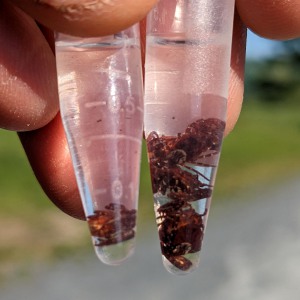Arts Review: ‘The Niceties’ puts racial, generational divide on display
| Published: 01-27-2023 9:07 PM |
Set in a professor’s office at an elite Northeast university, The Niceties displays racial and generational conflicts through a brave student and her pressure-hardened history professor. This play is not for the faint of pacemaker.
Directed by Grant Neale, The Niceties is a punchy debate, written by Eleanor Burgess. First produced in 2018, it’s now playing in an immersive presentation at Shaker Bridge Theatre in Enfield through Feb. 5.
This minimalist play draws you to question your perspective while humanizing national issues. Power and vulnerability flipping between the two characters redeems the grinding conflict between them.
Zoe Reed, an over-achiever unhappy with gradual change, pushes against historical injustices while juggling her future.
Alongside her is the tightly-wound liberal professor, Dr. Janine Bosko, who clings to academic rigidity. Until Reed’s criticism shatters her self-image as a progressive, that is. As both unravel their masks, it becomes clear that they’re spouting incompatible worldviews.
The conversation begins over a term paper but quickly becomes a clash of perspectives and identities.
The characters can stray from human beings into abstract ideas: “walking manifestos,” in Burgess’ words. Dialogue drifts and becomes heavy-handed. The focus shifts to injecting a viewpoint into the audience. But the subtle body awareness of both actors draws viewers back into the conflict.
In their debut performance at Shaker Bridge Theatre, Kayla Amani captures the deep, unmoving tension that Zoe bears.
Article continues after...
Yesterday's Most Read Articles
 Hartland voters successfully petition for school budget revote
Hartland voters successfully petition for school budget revote
 JAG Productions announces closure, citing ‘crisis facing the arts’
JAG Productions announces closure, citing ‘crisis facing the arts’
 Hanover’s Perreard may soon capture the attention of collegiate coaches in two athletic pursuits
Hanover’s Perreard may soon capture the attention of collegiate coaches in two athletic pursuits
Now piercing the audience with Janine’s rigor, Susan Haefner has previously appeared at Shaker Bridge in The Taming, The How and the Why and The Other Place.
Reed’s paper asserts that the American revolution was possible only because of slavery. The would-be radical revolution of Black Americans was repressed out of existence. Instead, unified moderate revolutionaries — the founding fathers — consumed their power.
The claim is “unsupported” by evidence, the professor says in her office. Reed counters that the evidence couldn’t have been created because of her claim’s subconscious nature and the period’s anti-literacy laws.
Frustrated, Zoe questions her professor’s limited perspective and capability as an educator; Janine’s version of American history ignores oppression and focuses on white heroism in a well-oiled democracy. The professor admits to shortcomings, but her analysis is based on primary documents — on accuracy.
Tensions mount with curse words a-flying. Janine deplores the naivety and self-pity of Zoe’s generation. She says that Zoe didn’t experience slavery and should move on — everyone’s tired of hearing about racism.
Aha, gotcha! Zoe’s been recording on her iPhone. A classic digital native move (the surreptitious recording of in -person conversations is legal in Connecticut, where the play is set, but not in New Hampshire).
With Amani the lone person of color in the entire theater at the Sunday matinee I attended, honest discourse about race seemed like an uphill battle. People will go home and strive to understand, yes, but I doubt we can adequately understand racial tension if everyone we interact with is white.
Although, perhaps it can lead the older generation of white folks to understand the waning trust in moderate, democratic change. This is all well and good, but let’s call it what it is: a white production for white discussion on race in America.
I wonder what would be possible if more Black folks were on the production team. Maybe Dr. Bosko wouldn’t progressively lose vitality because they’d be more comfortable probing her perspective. Maybe Reed’s contrary tenderness and animosity could be layered further.
Three weeks after their initial encounter, Zoe returns to Janine’s office with a seemingly misplaced hope for some kind of closure.
But as the elephant begins smashing the room, Janine (vainly) tells the quickly radicalizing Zoe to be more moderate. The play ends in dissonance.
Watching the two characters clash heads instead of finding a common cause, I wanted them to resolve so badly. Are things really so irreconcilable?
Janine wants things to go back to the way they were before the meeting. But to Zoe that’s not acceptable, and something needs to change.
This parallels the American discourse; in 2018, when the play premiered, many were unwilling to keep talking about injustice. People had lost trust in the moderate changes of democratic shiftings.
The play now shows almost three years after the Black Lives Matter uprising of 2020. I was in Minneapolis at the time — too scared to go out. But I enjoyed the play. Everyone stood up for it. But, in an all-white audience, we have no idea if The Niceties presents an accurate image of the Black experience.
Despite the abstract ideas and monochromatic environment, The Niceties certainly envelopes viewers in the conversation and makes you question your biases. Still, I wonder how more input from people of color could improve it.
Shaker Bridge Theatre’s production of The Niceties runs through Feb. 5 in Enfield’s Whitney Hall. For tickets or more information, go to shakerbridgetheatre.org or call 603-448-3750.
Lukas Dunford lives in Hanover.

 How a hurricane and a cardinal launched a UVM professor on a new career path
How a hurricane and a cardinal launched a UVM professor on a new career path Out & About: Vermont Center for Ecostudies continues Backyard Tick Project
Out & About: Vermont Center for Ecostudies continues Backyard Tick Project
